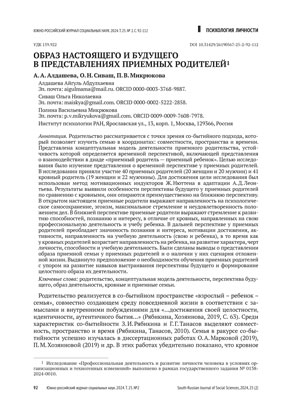Abstract
Parenting is considered from the point of view of the co-being approach, which allows studying the family in the coordinates of: jointness, space and time. The conceptual model of adaptive parenting activity is presented, the sustainability of which is determined by the time perspective, including perceptions of interaction in the dyad “adaptive parent-adaptive child”. The purpose of the study was to examine adaptive parents’ perceptions of time perspective. Forty adaptive parents (20 females and 20 males) and 41 biological parents (19 females and 22 males) participated in the study. To achieve the purpose of the study, the Motivational Inductors Method of J. Nütten in adaptation of A. D. Leontiev was used. The results revealed the peculiarities of adaptive parents’ perspective on the future in comparison with biological parents, the former group relies predominantly on the near future. In the open present, adaptive parentstend toexpress orientation to psychological self-preservation, egoism, maximum aspiration and dissatisfaction with the state of affairs. In the near-term perspective, adaptive parents express the aspiration for the development of abilities, cognition and interest, in contrast to biological parents, focused to their professional activity and the child’s studies. In the long term, adaptive parents are dominated by the importance of cognition and interest, achievement motivation, activity, orientation to learning activities (their own and the child’s), while the biological parents’ orientation to the child, to the development of character, personality traits, abilities and learning activities increases. Conclusions were drawn about adaptive parents’ representation of the adaptive family image and the presence of a delayed life script. It was suggested that adaptive parents should be trained with emphasis on the development of skills of building a future perspective and the formation of a holistic image of their activities.
Keywords
Funding information
The study “Professional activity and development of a person’s personality in the context of organizational and man-made changes” was carried out as part of the state task of the Ministry of Science and Higher Education of the Russia Federation (No. 0138-2024-0010).
References
Адлер, А. (1998). Воспитание детей. Взаимодействие полов. Ростов-на-Дону: Феникс.
Алдашева, А.А., Зеленова, М.Е., Сиваш, О.Н. (2021). Социально-перцептивный образ приемного ребенка у замещающих родителей с разной формой опеки. Социальная психология и общество, 12(2), 110–128. DOI: 10.17759/sps.2021120207
Алдашева, А.А., Сиваш, О.Н., Рунец, О.В. (2023). Психологические функции родительского труда. Южно-российский журнал социальных наук, 24(3), 85–101. DOI: 10.31429/26190567-24-3-85-101
Бессчетнова, О.В. (2023). Социальное благополучие детей, оставшихся без попечения родителей: между биологической и приемной семьей. Вестник Пермского университета. Философия. Психология. Социология, 2, 268–283.DOI 10.17072/2078-7898/2023-2-268-283
Мещеряков, Б.Г., Зинченко, В.П. (2003). Большой психологический словарь. СПб.: прайм-ЕВРОЗНАК; М.: ОЛМА-Пресс.
Горошко, В.Г., Шубина, О.В. (2017). Синдром отложенной жизни: актуальное состояние проблемы. В И.Б. Шуванова, Ю.Э. Макаревской, И.Г. Макаревской (ред.) Дружининские чтения: Сборник материалов XVI Всероссийской научно-практической конференции (с. 113–115). Сочи: Сочинский государственный университет.
Коркина, Н.А. (2003). Отцовство в современной семье. Семейная психология и семейная терапия, 4, 48–54.
Кузнецова, Т.Ю. (2003). Социальные стереотипы восприятия выпускников детских домов. Социологические исследования, 11(235), 84–88.
Лаврентьева, З.И. (2020). Методология исследования приемной семьи как педагогического феномена. Социально-политические исследования, 4(9), 135–146. DOI 10.20323/2658-428X‑2020-4-9-135-146
Лобанова, М.Ю. (2011). Изменение отношения приемных родителей к приемному ребенку и к его биологическим родителям: психологический аспект. Образование через всю жизнь: непрерывное образование в интересах устойчивого развития, 9, 278–279.
Майн, Н.В. (2017). Индивидуальная и межпоколенческая психотравматизация кандидатов в замещающие родители (автореферат кандидатской диссертации) Москва.
Маркина, О.А. (2019). Мотивация и родительские установки к усыновленному ребенку у женщин (автореферат кандидатской диссертации). Краснодар.
Махнач, А.В., Алдашева, А.А. (2012). Компоненты и признаки новой социономической профессии «приёмный родитель». В А.Л. Журавлев, Е.А. Сергиенко (ред.) Психологические проблемы современного российского общества (с. 457–479). Москва: Институт психологии РАН.
Меркуль, И.А., Машкова, Д.В. (2023). Подготовка кандидатов в замещающие родители: какие компетенции нужны сегодня для воспитания приемного ребенка? Социальные науки и детство, 4(1), 59–78. DOI: 10.17759/ssc.2023040104
Мизина, Н.Н. (2009). Родительская компетентность: психологический аспект проблемы. Сборник научных трудов Северо-Кавказского государственного технического университета. Серия «Гуманитарные науки», 7, 8–10.
Найденова, Е.В. (2021). Завышенные ожидания семьи как фактор формирования синдрома отложенной жизни. Северо-кавказский психологический вестник, 19/4, 34–47. DOI 10.21702/ncpb.2021.4.3
Нюттен, Ж. (2004). Мотивация, действие и перспектива будущего. М.: Смысл.
Плащинская, Н.С. (2018). Методика оценки образа приемной семьи у детей-сирот и кандидатов в принимающие родители. Молодой ученый, 27(213), 140–146.
Присяжная, Н.В. (2007). Дети-сироты: постинтернатное жизнеустройство. Социологические исследования, 11(283), 54–63.
Присяжная, Н.В. (2019). Конструируемый образ ребенка-сироты в представлениях москвичей. Социология медицины, 18(2), 78–84. DOI: 10.18821/1728-2810-2019-18-2-78-84
Равен, Дж. (2002). Компетентность в современном обществе: выявление, развитие и реализация. М.: Когито-Центр.
Рождественская, Е.Ю. (2020). Вовлеченное отцовство, заботливая маскулинность. Мониторинг общественного мнения: экономические и социальные перемены, 5(159). DOI: 10.14515/monitoring.2020.5.1676
Рябикина, З.И., Хозяинова, П.М. (2019). Неполная семья как пространство со-бытия матери и ребенка. Вестник Омского университета. Серия: Психология, 3, 62–68. DOI 10.25513/2410-6364.2019.3.62-68
Рябикина, З.И., Танасов, Г.Г. (2010). Субъектно-бытийный подход к личности и анализу её со-бытия с другими (конструктивная версия постмодернистских «настроений»). Человек. Сообщество. Управление, 2, 4–19.
Ситников, В.Л. (2001). Образ ребенка в сознании детей и взрослых. СПб.: Химиздат.
Татаренко, Д.Д. (2012). Детско-родительская адаптация в замещающих семьях. Вестник Московского государственного областного университета. Серия: Психологические науки, 2, 58–61.
Даль, В.И. (2004). Толковый словарь живого великорусского языка. Москва: Олма-Пресс: Крас. пролетарий.
Ушинский, К.Д. (1988). Три элемента школы. Педагогические сочинения. М.: Педагогика.
Читао, Р.А. (2014). Особенности субъективных представлений о замещающих родителях: гендерный аспект. Вестник Московского государственного областного университета. Серия: Психологические науки, 2, 47–58.
Шереги, Ф.Э. (2003). Дети с особыми потребностями. Социологический анализ. Москва: Центр соц. прогнозирования.
Щербина, С.М. (2017). Отношение приемной матери к ребенку в профессиональной замещающей семье (автореферат кандидатской диссертации). Москва.
Kirk, H.D. (1964). Shared Fate: A Theory of Adoption and Mental Health. London: The Free Press of Glencoe, Collier-Macmillan Ltd.
Miller, R.B., Brickman, S.J. (2004). A Model of Future-Oriented Motivation and Self-Regulation. Educational Psychology Review, 16(1), 9–33. DOI: 10.1023/B: EDPR.0000012343.96370.39
Simons, J., Vansteenkiste, M., Lens, W., Lacante1, M. (2004). Placing Motivation and Future Time Perspective Theory in a Temporal Perspective. Educational Psychology Review, 16, 121–139. DOI: 10.1023/B: EDPR.0000026609.94841.2f


